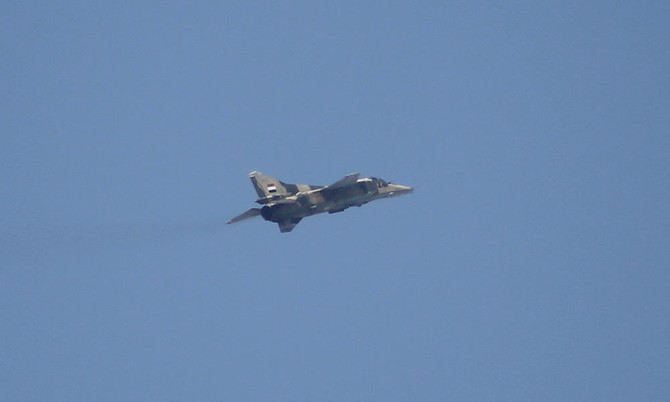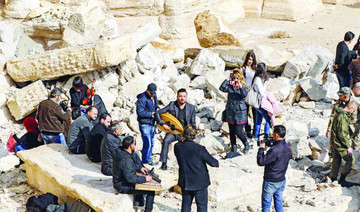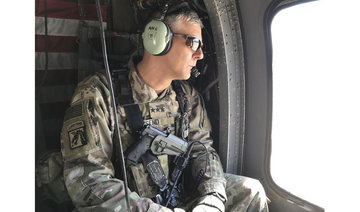ISTANBUL, Turkey: A Syrian air force pilot who bailed out as his warplane crashed on Turkish territory has been found by a Turkish rescue team and is being treated at a hospital in the Hatay region, a hospital spokeswoman said on Sunday.
Dogan news agency said the pilot, who crashed his plane on Sunday, had been found around 40 km (25 miles) from the wreckage. He was first taken to a gendarmerie base and then to hospital.
The hospital spokeswoman gave no details of his condition.
Syrian state television quoted an army source on Saturday saying the air force had lost contact with a fighter jet on a mission near the Turkish border. It gave no details.
It was unclear why the aircraft had crashed, whether it had been attacked or suffered technical failure.
Combat operations by many militia and government forces come close to Turkey’s long frontier with Syria.
Turkey has been one of the foremost critics of Syrian President Bashar Assad, and supports rebels fighting him in the country’s six-year-old war. It currently has armed forces involved in operations along the Syrian side of the frontier.
Syrian state media said on Saturday its forces had been expanding control over former Daesg-held villages in northwest Syria, an area close to Turkey’s Hatay region where the aircraft crashed.
The army’s gains follow a push to the south and east of the city of al-Bab, which was captured by Turkish-backed rebels late last month.
(Reporting by Ece Toksabay)
Syrian pilot rescued in Turkey after plane crashes
Syrian pilot rescued in Turkey after plane crashes

Crowds cheer, families hug as Palestinian prisoners released

A jubilant crowd carried Shallalta on their shoulders from the bus that brought him from jail, the freed prisoner still wearing his grey prison tracksuit.
“My situation was heartbreaking, truly heartbreaking. We pray to God to free all our brothers we’ve left behind,” he told the crowd, his head shaved and his face pale and thin under a long red beard.
“I can’t describe the feeling — just hearing the news that I would be released was overwhelming,” he said while shaking hands with well-wishers.
Around him Palestinians cheered and waved the national flag, as they welcomed dozens of prisoners who arrived in buses.
Hundreds waited in the local sports center where the prisoners were dropped off for a short health checkup, while hundreds more watched on from the surrounding hills as fireworks went off.
Israel said it released 200 Palestinian prisoners on Saturday in exchange for four Israeli women soldiers held in Gaza since Hamas’s October 2023 attack which sparked the war.
Not all of the prisoners were bused to Ramallah. Sixteen were taken to Gaza, while 70 were sent via Egypt into exile in Algeria, Tunisia or Turkiye.
A total of 121 of the prisoners released had been serving life sentences.
Tareq Yahya, another freed prisoner, spoke with emotion as he stepped off the bus into the crowd.
“It’s amazing how much love our people have shown us, how they’ve stood by us and expressed their solidarity,” the 31-year-old from the northern West Bank city of Jenin said.
Looking through the crowd, Yahya searched for relatives, finding none.
“It seems, based on the situation in Jenin, they weren’t able to make it,” he said, referring to an ongoing Israeli military operation in the city.
“I’ll try to find them, though.”
Thinking of the other prisoners who will be released in the coming weeks in exchange for Gaza hostages, Yahya said the ceasefire’s guarantors “need to set strong conditions to prevent the beatings, humiliation and mistreatment the jailers have inflicted on us in these last days before our release.”
Maisa Abu Bakr, 33, came early with her family to see her uncle Yasser Abu Bakr, whose name was on the list of those to be released this week.
She said they avidly followed the news “on Telegram and TV, and we were ready, wearing our (best) clothes, waiting for the time to get out and come here.”
Yasser Abu Bakr had been in jail since 2002 serving multiple life sentences.
“When the lists were published, we saw his name and we were surprised because we didn’t expect that he would be freed.”
Others were not so lucky, like the family of Sadiqi Al-Zaro, 65, who made the time-consuming journey from the southern West Bank city of Hebron through multiple Israeli checkpoints to Ramallah.
Zaro’s nephew Tareq told AFP the family had come after receiving a phone call from an Israeli intelligence officer who said he would be among those released on Saturday.
“We were shocked when the official lists were announced and his name wasn’t included,” he said.
The procedures for clearing prisoners for release are opaque and the final list was not released until a few hours before the buses arrived.
“There have been a lot of issues since the beginning of this prisoner release process. It’s been difficult for families to get clear confirmation,” Tareq Al-Zaro said, his cousins nodding in agreement.
He said he was still hoping for his uncle’s release after 24 years in prison.
“We’re leaving this in God’s hands. We came here based on a phone call, and God willing, he’ll be released based on an official announcement.”
30 killed in drone attack on hospital in Sudan’s Darfur

- Bombing of the Saudi Hospital on Friday evening “led to the destruction” of the hospital’s emergency building
PORT SUDAN: A drone attack on one of the last functioning hospitals in El-Fasher in Sudan’s Darfur region killed 30 people and injured dozens, a medical source said Saturday.
The bombing of the Saudi Hospital on Friday evening “led to the destruction” of the hospital’s emergency building, the source told AFP, requesting anonymity for fear of retaliation.
It was not immediately clear which of Sudan’s warring sides had launched the attack.
Since April 2023, the Sudanese army has been at war with the paramilitary Rapid Support Forces (RSF), who have seized nearly the entire vast western region of Darfur.
They have besieged El-Fasher, the state capital of North Darfur, since May, but have not managed to claim the city, where army-aligned militias have repeatedly pushed them back.
Last week, they issued an ultimatum demanding army forces and allies leave the city by Wednesday afternoon in advance of an expected offensive.
Local activists have reported intermittent fighting since, including repeated artillery fire from the RSF on the famine-hit Abu Shouk displacement camp.
On Friday morning alone, heavy shelling killed eight people in the camp, according to civil society group the Darfur General Coordination of Camps for the Displaced and Refugees.
The United Nations has voiced alarm, calling on both parties to ensure the protection of the city’s civilian population — some two million people.
“The people of El-Fasher have suffered so much already from many months of senseless violence and brutal violations and abuses, particularly in the course of the prolonged siege of their city,” United Nations rights office spokesman Seif Magango said Wednesday.
France in communication to maintain Hezbollah-Israel ceasefire, Lebanese statement citing Macron says

- Aoun asked Macron to oblige Israel to implement the agreement to preserve stability
CAIRO: French President Emmanuel Macron told his new Lebanese counterpart Joseph Aoun in a phone call that he is in communication to maintain the ceasefire between Hezbollah and Israel, according to a statement by the Lebanese President’s office on X.
Aoun asked Macron to oblige Israel to implement the agreement to preserve stability.
The phone call comes after the Israeli army on Saturday warned residents of dozens of Lebanese villages near the border against returning until further notice, a day after Israel said its forces would remain in south Lebanon beyond a Sunday deadline for their departure under the US-brokered ceasefire that ended last year’s war.
70 freed and ‘deported’ Palestinian prisoners reach Egypt

- According to Israeli list, more than 230 Palestinian prisoners to be released under the deal are serving life sentences
- They will be permanently expelled from the Palestinian territories upon their release
CAIRO: Seventy Palestinian prisoners arrived aboard buses in Egypt Saturday after being released from Israel as part of a Gaza ceasefire deal, state-linked Egyptian media reported.
Al-Qahera News, which is linked to state intelligence, said the prisoners were those “deported” by Israel, adding they would be transferred to Egyptian hospitals for treatment.
According to a list previously made public by Israeli authorities, more than 230 Palestinian prisoners to be released under the deal are serving life sentences for deadly attacks on Israelis, and will be permanently expelled from the Palestinian territories upon their release.
Broadcasted footage on Saturday showed some of the prisoners, wearing grey tracksuits, disembarking from two buses on the Egyptian side of the Rafah border crossing with Gaza.
After transiting in Egypt, the deported prisoners “will choose either Algeria, Turkiye or Tunisia” to reside, Amin Shuman, head of the Palestinian prisoners’ affairs committee, told AFP.
“It’s an indescribable feeling,” one of those released told Al-Qahera News, smiling and waving from the window of the bus.
The prisoners transferred from the Ktziot prison in Israel’s Negev desert into Egypt are part of a group of 200 prisoners released Saturday in exchange for four Israeli hostages freed by Hamas militants in Gaza.
Police kill a man who set himself on fire outside a Tunisian synagogue

- The man advanced toward a law enforcement officer while ablaze, and a second officer opened fire to protect his colleague
- The officer was hospitalized with burns, as was a passerby
TUNIS: A man set himself on fire in front of the Grand Synagogue in the Tunisian capital and was killed by police, the Interior Ministry said. A police officer and a passerby suffered burns.
The man started the fire after sundown Friday, around the time the synagogue holds Sabbath prayers.
The Interior Ministry said in a statement that the man advanced toward a law enforcement officer while ablaze, and a second officer opened fire to protect his colleague. The officer was hospitalized with burns, as was a passerby, the statement said.
The ministry did not release the man’s identity or potential motive for his act, saying only that he had unspecified psychiatric disorders.
Tunisia was historically home to a large Jewish population, now estimated to number about 1,500 people. Jewish sites in Tunisia have been targeted in the past.
A national guardsman killed five people at the 2,600-year-old El-Ghriba synagogue on the island of Djerba after an annual pilgrimage in 2023. Later that year, pro-Palestinian protesters vandalized a historic synagogue and sanctuary in the southern town of El Hamma. And a garden was set ablaze last year outside the synagogue in the coastal city of Sfax.
Tunisia’s recent history was also marked by the self-immolation of a street vendor in 2010 in a protest linked to economic desperation, corruption and repression. Mohamed Bouazizi’s act unleashed mass protests that led to the ouster of Tunisia’s autocratic ruler and uprisings across the region known as the Arab Spring.





















